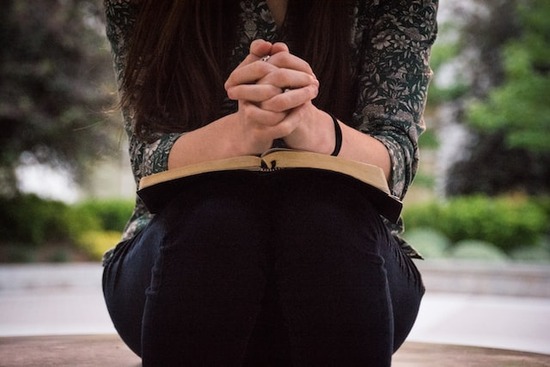Prayer—How Do I Do It?
Prayer is intentional communication with God.
And the way you go about it is much like how you’d communicate with your best friend. You can reach out anytime and anywhere, in the way that’s most natural between the two of you.
In the same way, you can pray to God any time, anywhere, in any way that directs your thoughts toward God.
And what makes prayer even better than talking to your friend is that God doesn’t have availability limitations. And He’ll always understand you—no need to stress about finding the “right words.”
You can talk to Him as a child to a perfect, loving father.
But if you’d like some more details, as well as some methods or how-tos, let’s go over some options. We’ll go over some of the when, where, and how of prayer, with the Bible as our guide.
We’ll answer these 4 common questions:
- How many times should I pray in a day?
- Where should I pray?
- Whom should I pray with?
- Is there a specific position for praying?
Let’s begin with the when of prayer.
How many times should I pray in a day?
As many times as you can, or want to.
Think about it this way. If you have a trusted friend you can always depend on, you don’t usually limit your time with them. You want to talk as much as possible!
It’s the same with God.
That’s why we’re encouraged to “pray without ceasing” (1 Thessalonians 5:17, NKJV).
This doesn’t mean that we have to devote every moment of our days to kneeling down in formal prayer. Instead, it’s about being in constant communication with God (Romans 12:12).
You can even pray in between classes at school, as you walk down the hall to wake up your kids, or in the drive-thru line when you’re grabbing an on-the-go breakfast on a hectic day.
It’s amazing how helpful it can be just to engage in a simple prayer here and there throughout the day.
- We can thank Him for the little blessings we stop to notice
- We can recall previous answers to prayer and express gratitude
- We can ask Him for help with an urgent decision
- We can express to Him our stresses or struggles of the moment (1 Peter 5:7)
- We can take a few minutes to pause and let Him calm us
- We can involve Him in all that we do, seeking to be in harmony with His will (1 Thessalonians 5:18), since He knows us better than we know ourselves!
But it’s also good to have a number of times in a day that we dedicate to prayer. Here are some examples of when people carved out specific times for prayer in the Bible:
- Daniel used to “pray three times in a day” (Daniel 6:10, NKJV).
- The Psalmist also said, “evening, and morning and at noon will I pray” (Psalms 55:17, NKJV).
- When Jews would visit the temple, “the people were praying outside at the time of incense” (Luke 1:10, NKJV).
- The disciples “Peter and John went to the temple in the hour of prayer being the ninth hour” (Acts 3:1, NKJV).
It’s always good to have dedicated times for prayer. Just like we might set a weekly lunch date with our friend.
It also helps keep us accountable. We can make prayer time part of our routines so that our relentless and neverending to-do lists don’t end up smothering it from our schedule.
And we’ll know when we miss a prayer time. Sometimes we can really feel the difference on the days we don’t get our regular devotional time!
But upon noticing that, we can go back and see what distracted us and get back on track to communicating regularly with God.
It’s as simple as directing our thoughts to Him in prayer, and listening to His voice as we read His Word, the Bible.
To begin cultivating a prayer-time habit, start by scheduling some quiet time in your daily calendar. Maybe you’ll want to do it first thing in the morning, before the rush of the day. Or maybe you’ll choose some time before you go to bed, once you’ve ended your day and set all distractions aside.
If you’d like some guidance in getting started, you can use a devotional book or email series, or a daily prayer guide. These types of resources can provide specific Bible verses with promises you can claim in your prayers.
Paul tells us in Philippians 4 that “in everything by prayer and supplication with thanksgiving let your request be made known to God” (verse 6, NKJV). We can trust that He wants to guide us and help us experience the joy and peace only His Holy Spirit can bring (verse 7).
Where should I pray?
 Just like you can pray at any time, you can also pray anywhere.
Just like you can pray at any time, you can also pray anywhere.
There’s no physical place we could go that would keep God from hearing our prayers.
However, there might be a physical place that helps us pray more easily, or that helps us block out distractions.
So it can still be a good idea to devote a specific place for our prayer time. And as we associate this place with our communion with Jesus, it can inspire reverence and peace within us just by being in it.
Jesus had a favorite place where He often went to pray. Before His crucifixion, He “went as was His custom to the Mount Olives” to pray (Luke 22:39, NKJV).
A church is also a good place to pray. In fact, Jesus said that the temple (church) is “called the house of prayer” (Matthew 21:13, NKJV).
But you can also pray at home, in prayer rooms, alone in your car, sitting on a bench in the park, or wherever you feel your need for God’s presence and ever-listening ear. Even while driving on a busy street, you can whisper a prayer to God with assurance that He’ll hear and answer it.
Here are a few biblical examples of not-so-ordinary places people prayed:
- “Jonah prayed unto the Lord His God out of the fish’s belly” (Jonah 2:1, NKJV).
- Nehemiah silently “prayed to the God of heaven” while standing in front of the King (Nehemiah 2:4, NKJV).
- Jesus prayed while He was on the cross: “Father, into Your hands I commend My spirit” (Luke 23:46, NKJV).
- Paul and Silas prayed while in prison: “And at midnight Paul and Silas prayed… and the prisoners heard them” (Acts 16:25, NKJV).
Whom should you pray with?
You can have individual, private prayers or you can pray with others as a group.
Group/corporate/public prayers
 These organized prayer sessions can be offered in unison by more than one person, sometimes at the same time. All the people participating could be in the same location, or they can even do it remotely and connect through their phones or computers, like using Skype, FaceTime, or Zoom.
These organized prayer sessions can be offered in unison by more than one person, sometimes at the same time. All the people participating could be in the same location, or they can even do it remotely and connect through their phones or computers, like using Skype, FaceTime, or Zoom.
In most cases, one person prays on behalf of the rest (intercessory prayer), or they take turns praying for one another.
There are also times when everyone prays quietly at the same time.
But why are public or group prayers important?
Group prayers unite the group members with each other and with God. Members feel that they are not alone in their struggles. They’re comforted and consoled by others, even as they seek the help of God or a revelation of God’s will in a given situation.
And as we unite in intercession for others we pray for, our own spirits are enriched as we commune with God.
Matthew 18:20 says that whenever two or three are gathered in the name of Jesus, His presence is there with them.
So apart from having each other there for support, we’re also comforted by God’s presence through the Holy Spirit.
Have you ever had a problem, then someone offered to pray with you for a solution? It can help take that weight off your shoulders and direct your thoughts toward God.
The Bible tells us that even Jesus Himself longed for His friends to pray with Him in His most trying moment, just before His crucifixion.
Matthew tells us that He became “sorrowful even unto death.” Then He took three of His disciples; John, James and Peter as prayer partners and told them, “stay here and watch [pray] with me” (Matthew 26:38, NKJV).
Here are some factors to consider when praying as a group:
- Public prayers should be kept simple and short so it’s easy for others to follow. That way, it’s easier for them to keep their own thoughts directed toward God.
This is in line with what Jesus said when He advised against using a bunch of flowery, poetic speech to significantly lengthen prayers. The Pharisees would do this, thinking their prayers would “be heard because of their many words” (Matthew 6:7, NASB). But God already knows our needs! We don’t need to explain it in every way possible. The whole point is being intentional about putting these things in God’s hands.
- As much as possible, use phrasing that everyone involved understands.
- Unless a specific situation calls for it, you don’t need to openly confess your private sins. And never mention private confessions of others. When praying about confession and forgiveness, keep the phrasing general, allowing each of the individuals praying to direct their own struggles to God.
Private/personal prayers
These prayers are just between you and God. If possible, you might look for a secluded place that helps you quiet your mind and focus.
Though you could also have a private prayer even while standing within a crowd of people. It’s to Whom your mind is directed that counts.
Jesus said, “when you pray, go into your own room, and when you have shut your door, pray to your Father who is in the secret place…” (Matthew 6:6, NKJV).
Why are private prayers necessary?
 Sometimes, all we need is to be alone with our Heavenly Father to just pour our hearts to Him.
Sometimes, all we need is to be alone with our Heavenly Father to just pour our hearts to Him.
Just like we can do with a close friend.
Even though friends often talk in a public place, sometimes we need to talk with them in a private place. Times when we need to share something of a heavier subject matter, or if we need to work on an issue together and concentrate.
Even Jesus often “departed into a lonely place, and there prayed” (Mark 3:35, NKJV).
In fact, most of Jesus’ prayer life was a private one.
As the Son of God, often misunderstood and with the burden of our salvation on His shoulders, He often retreated to talk with His Father who understood Him and His mission best.
In the same way, when you feel no one understands you, or if you feel overwhelmed by your struggles and life’s burdens, you can turn to God and pray to Him since He understands us more than any other person could.
Private prayer time is when we can confess anything—even the thoughts and fears we have in the deepest corners of our minds. Even the thoughts we’re ashamed of or scared of. God hears it all, and receives our prayers with unconditional love.
We find a good example with Jacob, when he was threatened by his brother. Since only Jacob and God understood the details of the sin he committed against his brother, he sent his family away so that he “was left alone.” Then he wrestled with God in prayer until he was forgiven (Genesis 32:24, NKJV).
Also, private prayers can be longer than public prayers. You can take your time, just the way Jesus often “continued all night in prayer to God” (Luke 6:12, NKJV).
This is the time to tell Him about all your needs and situations, and even intercede for your loved ones you might be concerned about.
Is there a specific position for praying?
There isn’t an exact position we’re required to assume while praying. What’s most important is that we realize we’re talking to the God of all the universe. It’s appropriate to foster an attitude of reverence when we pray (Psalms 111:9).
And God understands our most personal circumstances. He knows that we need to pray while we’re driving in our cars, while in the middle of a tough work situation, or while we’re rocking a crying baby.
Or if you’re in a public place and feel your need to pray, you can just go ahead in the most unnoticeable way. Just like Nehemiah did while standing before the Persian king (Nehemiah 2:4).
Here are examples of prayer positions in the Bible
Sometimes the way we position ourselves can help us express ourselves and cultivate an attitude of worship and respect. If you think this might be helpful for you, here are some examples from Scripture about how people positioned themselves while praying.
- Kneeling down
 This is the most common position for both public or private prayer because kneeling symbolizes reverence and respect. We lower ourselves in submission, showing that we recognize God’s authority.
This is the most common position for both public or private prayer because kneeling symbolizes reverence and respect. We lower ourselves in submission, showing that we recognize God’s authority.
In Luke 22:41, Jesus “knelt down and prayed” (NKJV). And in several instances, the disciples also “kneeled down and prayed” (Acts 9:4; 20:26; 21:5, NKJV).
Paul even says, “I bow my knees unto the Father of our Lord Jesus Christ” (Ephesians 3:14, NKJV).
Of Daniel, it is written that he “kneeled down upon his knees three times a day and prayed” (Daniel 6:10, NKJV).
And the Psalmist calls us to “kneel before the Lord our maker” (Psalms 95:6, NKJV).
- Bowing down
Bowing down before someone is an act of worship, because it also symbolizes submission, gratitude, and respect. That’s why many people lower their heads while they pray.
When Abraham’s servant saw that his prayer had been answered, “he worshiped the Lord, bowing himself to the earth” (Genesis 24:52, NKJV).
And in the story of the repentant tax collector, he showed his heartfelt submission in the way that he “would not even raise his eyes to heaven…and saying, ‘God, have mercy on me, a sinner!” (Luke 18:13, CSB).
Bowing our heads can also help to block out distractions so we can concentrate.
- Lifting up hands
 This is a sign of surrender, openness, and acceptance. When we lift up our hands in prayer, we show that we can do nothing unless we receive God’s help. And we’re open to what He has in store for us.
This is a sign of surrender, openness, and acceptance. When we lift up our hands in prayer, we show that we can do nothing unless we receive God’s help. And we’re open to what He has in store for us.
In his letter to Timothy, Paul advises people to “pray, lifting up holy hands without anger or argument” (1 Timothy 2:8, NKJV).
- Looking up toward heaven
Looking up to heaven, symbolized by looking up in general, can also be a signal of dependence on God.
In John 17, Jesus “lifted up His eyes to heaven” and prayed. Also, when He resurrected Lazarus, “Jesus lifted up His eyes” and prayed (John 17:1; 11:41, NKJV).
- Lying flat
In some Bible versions, this is referred to as “laying prostrate” as a sign of ultimate submission before God (Deuteronomy 9:18, 25; 1 Chronicles 29:20).
It’s more than just kneeling down and bowing your head. Sometimes people do this while still on their knees, or sometimes they stretch themselves out completely. But the idea is that you’re placing your hands out on the ground, facing downward, and relaxing your entire body.
Again, we find an example in Jesus for this prayer position. He “fell on His face and prayed” (Matthew 26:39, NKJV). And Ezekiel the prophet also records that he prayed in this position. He says, “I fell down upon my face, and cried with a loud voice and said, Ah Lord God!” (Ezekiel 11:13, NKJV).
This often happened during very sincere prayers or confessions, sometimes out of desperation. These people’s actions demonstrated their total dependence on God.
- Standing
Sometimes you might be in a situation where people are asked to stand during a prayer.
In the story recorded in Luke 18, both the Pharisee and the tax collector stood while praying (Luke 18:11, 13).
Also, in the Old Testament sanctuary services, the Levites were required “to stand every morning to thank and praise the Lord, and likewise at evening” (1Chronicles 23:30, NKJV).
Standing while in prayer can demonstrate an attitude of readiness, expressing our willingness to take what God gives us and go where He leads. It can foster an attitude of support and solidarity, similar to the meaning in phrases like “stand together,” “stand up for,” or “stand with,” etc.
- Sitting
 This is the position King David assumed when he prayed to acknowledge the covenant the Lord made with him (2 Samuel 7:18,27).
This is the position King David assumed when he prayed to acknowledge the covenant the Lord made with him (2 Samuel 7:18,27).
Sitting down isn’t mentioned much in the Bible. But considering that sitting is a common human posture, people must have prayed this way many times. It allows us to rest and to focus.
- While laying in bed
This position isn’t talked about as much in regards to prayer, but it’s certainly a time when many people end up praying.
Though we are told that when King Hezekiah was sick and about to die on his deathbed, he “turned his face to the wall and prayed unto the Lord” (2 Kings 20:2, NKJV).
God looks at the heart
As you have seen in the examples above, there are many ways that we can pray.
And there’s no wrong way to pray! Sincerity is all that matters.
Beyond outward positions and manners, or the places and occasions when we pray, God looks at the heart. When we acknowledge who He is, and that we are His children, we approach Him with reverence that only He is deserving of. “The Lord is a great God and a great King above all gods” (Psalm 95:3, NKJV).
Even in the Lord’s prayer, Jesus specified that apart from calling God our Father, we also recognize His worthiness of praise, honor, and worship (Matthew 6:9).
The psalmist says that what is most valuable to God is a broken (humble) spirit and a repentant heart (Psalm 51:17).
So as we pray, the one thing to remember is that we can let all our guards down. God knows our darkest secrets already, and there’s no reason to hide anything from Him because He already loves us and accepts us.
Our part is in trusting His love and care for us, having faith in His power to answer our prayers.
God’s Word is full of many wonderful promises He’s made to us. And unlike men who sometimes make promises and fail to fulfill them, “all the promises of God in Him are yes, and in Him, Amen” (2 Corinthians 1:20, NKJV).
We can claim these promises and trust that He will fulfill them because “God is not man, that He should lie… has He said and shall He not do it?” (Numbers 23:19, NKJV).
To learn more about prayer, check out our article on Prayer—What Is It and Why Is It Important?
And you can also share your prayer request for us to pray for or with you by filling out the prayer request form below.
Related Articles
Questions about Adventists? Ask here!
Find answers to your questions about Seventh-day Adventists
More Answers
The Health Benefits of Fresh Air You Should Know About
The Health Benefits of Fresh Air You Should Know About“When you can’t breathe, nothing else matters,” the American Lung Association tells us. And while that’s true, the kind of air you’re breathing will determine the health benefits you experience. Breathing fresh...
What Do Seventh-day Adventists Choose to Eat?
What Do Seventh-day Adventists Choose to Eat?Food blogs overwhelm the internet; food fads are all the rage; and copycat and healthy versions of food are the subject of many a get-together. Eating—and eating the best way—is a big deal. And everybody has a different...
10 Incredible Ways Sunlight Can Improve Your Health
10 Incredible Ways Sunlight Can Improve Your HealthAre you concerned about sunlight’s negative effects? You might be the one who lathers on the sunscreen and covers up when you go outside. Or maybe you avoid being outside as much as possible. You might be surprised,...
Why Is Water So Important?
Why Is Water So Important?We all know that water is a substance we can’t live without. It quenches our thirst and keeps us hydrated on the inside. And it’s necessary for hygiene and cleansing on the outside too. But did you know that the cleansing properties of water...
Ellen White’s Writings and the Adventist Health Message
Seventh-day Adventists are known for their emphasis on healthy living. And Ellen G. White was a significant influence in the development of this priority and practice among Adventists.
Health Clinics
Ellen White and Adventist Healthcare—Ahead of Their Time Medical care in the mid-1800s was primitive, to say the least. Basic concepts we take for granted—such as proper handwashing or recognizing the dangers of bloodletting—were nonexistent. And doctors often had...
What Did Ellen White Teach about Vegetarianism?
What Did Ellen White Teach about Vegetarianism?One thing you might have heard about Seventh-day Adventists is their emphasis on a vegetarian lifestyle. If you’re wondering why that is, it goes back to our church’s humble beginnings: As Adventists studied the Bible,...
How Ellen White’s Teachings Can Improve Your Health
How Ellen White’s Teachings Can Improve Your Health Healthcare in the nineteenth century was said to leave “more disease than it took away” with its use of bloodletting and “medicines” like mercury and arsenic.1 As people questioned these methods, new approaches...
Change Your Perspective on Life with These 5 Mindsets
5 Biblical Mindsets to Change Your Life for the Better Sometimes, life is just plain hard. There’s no way around it. So would thinking about things differently really change anything? Our perspective on life, and everything it throws at us, affects more than we’re...
Bible Promises for When You’re Worried or Fearful
Bible Promises for When You’re Worried or Fearful The Bible is full of beautiful promises that can comfort us in a variety of situations. They can give us hope when we are hopeless, make us feel grateful for God’s love, and comfort us when we’re grieving or suffering....
12 Practical Ways to Overcome Worry
12 Practical Ways to Overcome Worry DISCLAIMER: This content is for informational purposes only. It does not constitute any professional medical advice and is not intended as a substitute for professional mental health therapy. It’s easy to get stuck in a cycle of...
How the Bible Talks About Worry, Fear, and Anxiety
How the Bible Talks About Worry, Fear, and Anxiety Worry and fear are the ingredients of anxiety. It’s easy to see how the world isn’t perfect—and the anticipation of a bad event or experience (that may or may not even happen) can end up draining the peace and...
How to Calm Anxious Thoughts, Using the Bible
How to Calm Anxious Thoughts, Using the Bible You were expecting a phone call from your daughter half an hour ago, and she still hasn’t called. She’s also not answering your calls. You feel your heart thumping as your thoughts race: What if she’s been in a car...
What You Should Know About the Adventist Health Studies
What You Should Know About the Adventist Health StudiesYou may have heard that Seventh-day Adventists care about health. But what you may not know is that Adventists have been the subjects of long-term research into lifestyle and health. Since 1958, researchers from...
Benefits of Sunlight
Yes, There Are Health Benefits of SunlightDespite the bad reputation it’s gotten, sunlight is generally associated with positivity, as shown by songs like “You Are My Sunshine,” or phrases that refer to delightful people as having a “sunny disposition.” There’s a...
Why Your Body Needs Rest for Optimal Health
Why Your Body Needs Rest for Optimal HealthStruggling to think straight? Wondering why you can’t remember that important tidbit you heard earlier today? Feeling like your emotions are about to explode? These are just some of the symptoms that can reveal your need for...
The Seventh-day Adventist Diet: One of Our Key Longevity Secrets
The Seventh-day Adventist Diet: One of Our Key Longevity SecretsOats, avocados, lentils, tofu—probably not what you first think of in a standard American diet. But if you show up at the home of an Adventist, chances are you may be served one of these staples. Out of a...
Why You Need Fresh Air
Why You Need Fresh Air“When you can’t breathe, nothing else matters,” the American Lung Association tells us. We couldn’t agree more! Breathing in clean air is an essential part of caring for our bodies, which God has given us. Together with other health principles,...
Sabbath Meal
Everything You Need to Know About Sabbath MealsFor Seventh-day Adventists, sharing a Sabbath meal with friends and family is one of the most special and memorable parts of the Sabbath. That’s why we want to share with you all about Sabbath meals and why they’re such a...
Adventists and Healthy Living
Adventists and Healthy LivingWhat’s the Adventist “Health Message” All About? One thing Seventh-day Adventists are known for is their emphasis on living healthy lives. Since our bodies are living temples of the Holy Spirit (1 Corinthians 6:19, 20), we strive to stay...
Water’s Importance—Physical Benefits and Spiritual Applications
Water’s Importance—Physical Benefits and Spiritual Applications We all know that water is a substance we can’t live without. Not only does it quench our thirst and keep us hydrated from the inside, but it’s necessary for hygiene and cleansing on the outside as well....
How Important is a “Day of Rest?”
How Important is a “Day of Rest?” Why God Created a Day for Downtime by Martin Casper Do you ever experience the feeling of complete overload? Do you feel like the only way you can get ahead is by slamming it 24/7? I hear these types of comments more and more...
7 Reasons Why a Day of Rest is Important
7 Reasons Why a Day of Rest is ImportantWe live in a fast-paced world. It seems as if success is measured in how much you can do in a short amount of time. (Extra points for the service or product that is available 24/7). The idea that we will be more successful if we...
How do Adventists choose what to eat?
How do Adventists choose what to eat?Every day, parents go through the ritual of getting their kids to eat what is healthy and good while trying to steer them away from what can hinder the growth of their developing bodies. Nutritionists work with their clients to...
How Can I Have a Better Marriage?
Is it possible to have a happy marriage?
How do Adventists make movie and music choices?
How do Adventists make movie and music choices?Cinema has come a long way since the first clips of motion pictures came to light in 1878. As the decades rolled on, film and music producers have created rivers of movies and albums for the masses. Today, watching movies...
Why are many Adventists Vegetarian?
Why are many Adventists Vegetarian?The diet intended for man is outlined in Genesis 1:29, “And God said, ‘See, I have given you every herb that yields seed which is on the face of all the earth, and every tree whose fruit yields seed; to you it shall be for food.’”...
Didn’t find your answer? Ask us!
We understand your concern of having questions but not knowing who to ask—we’ve felt it ourselves. When you’re ready to learn more about Adventists, send us a question! We know a thing or two about Adventists.























